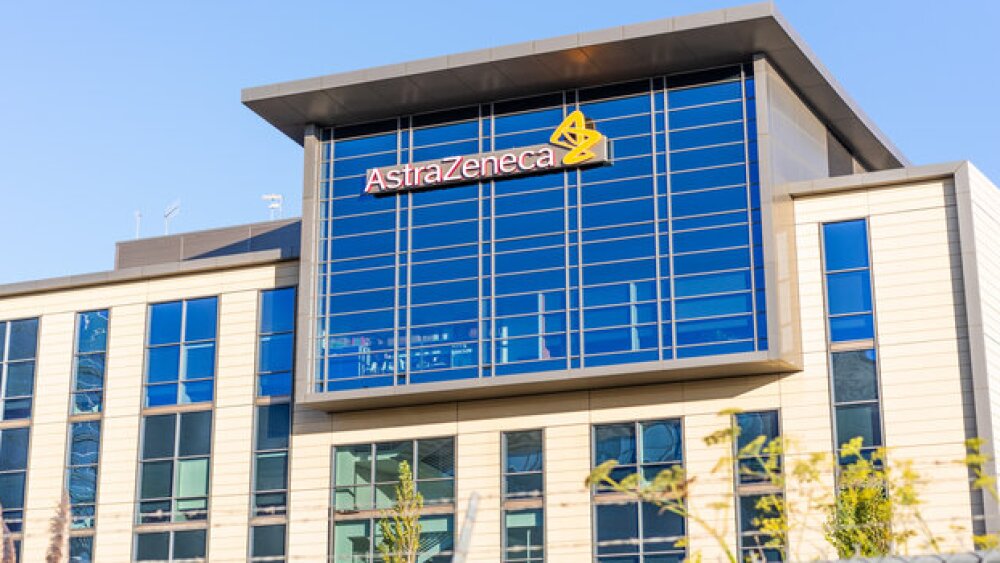When given with chemoradiotherapy, Imfinzi in a late-stage non-small cell lung cancer study did not lead to significant improvements in progression-free survival versus chemoradiotherapy alone.
Pictured: AstraZeneca’s headquarters building in California/iStock, Sundry Photography
AstraZeneca’s Imfinzi (durvalumab), administered concurrently with chemoradiotherapy, missed its primary efficacy endpoint in the Phase III PACIFIC-2 trial in non-small cell lung cancer, the company announced Tuesday.
Although AstraZeneca did not provide specific data in its press release, the company said that patients who were treated with the investigational Imfinzi-CRT regimen did not see significantly better progression-free survival (PFS) than those who received chemoradiotherapy (CRT) alone.
PACIFIC-2 found a safety and tolerability profile that was broadly consistent with what had been previously established for both Imfinzi and CRT, though there was an “increased rate of infection” in patients that were given the concurrent treatment regimen.
Imfinzi is a human monoclonal antibody that binds to the PD-L1 protein, blocking its interaction with the PD-1 receptor. In turn, this mechanism prevents the cancer cells from evading the immune system, while also boosting the body’s immune responses against tumors.
The FDA first approved Imfinzi in February 2018 for the treatment of adult patients with unresectable Stage III non-small cell lung cancer (NSCLC). Imfinzi remains the “established, global standard of care” in this indication, according to AstraZeneca’s announcement. However, according to its label, it can only be used after concurrent platinum-based chemotherapy and radiation therapy.
“Our goal with the PACIFIC-2 trial was to address a remaining unmet need for patients in this setting by introducing immunotherapy even earlier and concurrently administering Imfinzi with chemoradiotherapy,” Susan Galbraith, executive vice president of Oncology R&D at AstraZeneca, said in a statement.
Despite PACIFIC-2’s failure, AstraZeneca will continue to push Imfinzi into earlier stages of lung cancer treatment. The company is currently conducting the PACIFIC-4 study in medically inoperable or unresected Stage I to II NSCLC, as well as the PACIFIC-5, -8 and -9 trials—all focusing on unresectable Stage III NSCLC.
AstraZeneca is also testing Imfinzi in the ADJUVANT BR.31 trial in resectable NSCLC and the ADRIATIC study in limited-stage small cell lung cancer.
Beyond lung cancer, Imfinzi is also indicated for locally advanced or metastatic biliary tract cancer and unresectable hepatocellular carcinoma (HCC). The PD-1 blocker was also previously under accelerated approval for the treatment of bladder cancer. AstraZeneca voluntarily withdrew this indication in February 2021 following disappointing results from the Phase III DANUBE study.
PACIFIC-2’s failure on Monday breaks a small winning streak for Imfinzi. Last Week, AstraZeneca reported a “statistically significant and clinically meaningful” PFS improvement in HCC patients when given alongside transarterial chemoembolization and bevacizumab.
In October 2023, a combination regimen of Imfinzi plus standard-of-care chemotherapy significantly improved pathologic complete response rate in patients with gastric and gastroesophageal junction cancers. In April 2023, the PD-1 blocker combined with Lynparza (olaparib) aced the Phase III DUO-O trial in high-grade epithelial ovarian cancer.
Tristan Manalac is an independent science writer based in Metro Manila, Philippines. He can be reached at tristan@tristanmanalac.com or tristan.manalac@biospace.com.






